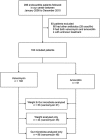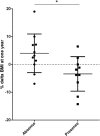Lactobacillus reuteri and Escherichia coli in the human gut microbiota may predict weight gain associated with vancomycin treatment - PubMed (original) (raw)
Lactobacillus reuteri and Escherichia coli in the human gut microbiota may predict weight gain associated with vancomycin treatment
M Million et al. Nutr Diabetes. 2013.
Abstract
Background: Antibiotics, used for 60 years to promote weight gain in animals, have been linked to obesity in adults and in children when administered during early infancy. Lactobacillus reuteri has been linked to obesity and weight gain in children affected with Kwashiorkor using ready-to-use therapeutic food. In contrast, Escherichia coli has been linked with the absence of obesity. Both of these bacteria are resistant to vancomycin.
Objectives and methods: We assessed vancomycin-associated weight and gut microbiota changes, and tested whether bacterial species previously linked with body mass index (BMI) predict weight gain at 1 year. All endocarditis patients treated with vancomycin or amoxicillin in our center were included from January 2008 to December 2010. Bacteroidetes, Firmicutes, Lactobacillus and Methanobrevibacter smithii were quantified using real-time PCR on samples obtained during the 4-6 weeks antibiotic regimen. L. reuteri, L. plantarum, L. rhamnosus, Bifidobacterium animalis and E. coli were quantified on stool samples obtained during the first week of antibiotics.
Results: Of the193 patients included in the study, 102 were treated with vancomycin and 91 with amoxicillin. Vancomycin was associated with a 10% BMI increase (odds ratio (OR) 14.1; 95% confidence interval (CI; 1.03-194); P=0.047) and acquired obesity (4/41 versus 0/56, P=0.01). In patients treated with vancomycin, Firmicutes, Bacteroidetes and Lactobacillus increased, whereas M. smithii decreased (P<0.05). The absence of E. coli was an independent predictor of weight gain (OR=10.7; 95% CI (1.4-82.0); P=0.02). Strikingly, a patient with an 18% BMI increase showed a dramatic increase of L. reuteri but no increase of E. coli.
Conclusion: The acquired obesity observed in patients treated with vancomycin may be related to a modulation of the gut microbiota rather than a direct antibiotic effect. L. reuteri, which is resistant to vancomycin and produces broad bacteriocins, may have an instrumental role in this effect.
Figures
Figure 1
Study flowchart.
Figure 2
Global modification of the gut microbiota during long-term amoxicillin or vancomycin treatment. *P<0.05, **P<0.005, ***P<0.0005 compared with controls. All the significant comparisons have been confirmed after Dunn's multiple comparisons test.
Figure 3
Weight change at 1 year in patients under vancomycin treatment according to the presence or absence of E. coli in the initial gut microbiota. *P<0.05.
Similar articles
- Obesity-associated gut microbiota is enriched in Lactobacillus reuteri and depleted in Bifidobacterium animalis and Methanobrevibacter smithii.
Million M, Maraninchi M, Henry M, Armougom F, Richet H, Carrieri P, Valero R, Raccah D, Vialettes B, Raoult D. Million M, et al. Int J Obes (Lond). 2012 Jun;36(6):817-25. doi: 10.1038/ijo.2011.153. Epub 2011 Aug 9. Int J Obes (Lond). 2012. PMID: 21829158 Free PMC article. Retracted. - Correlation between body mass index and gut concentrations of Lactobacillus reuteri, Bifidobacterium animalis, Methanobrevibacter smithii and Escherichia coli.
Million M, Angelakis E, Maraninchi M, Henry M, Giorgi R, Valero R, Vialettes B, Raoult D. Million M, et al. Int J Obes (Lond). 2013 Nov;37(11):1460-6. doi: 10.1038/ijo.2013.20. Epub 2013 Mar 5. Int J Obes (Lond). 2013. PMID: 23459324 Free PMC article. Retracted. - Abnormal weight gain and gut microbiota modifications are side effects of long-term doxycycline and hydroxychloroquine treatment.
Angelakis E, Million M, Kankoe S, Lagier JC, Armougom F, Giorgi R, Raoult D. Angelakis E, et al. Antimicrob Agents Chemother. 2014 Jun;58(6):3342-7. doi: 10.1128/AAC.02437-14. Epub 2014 Mar 31. Antimicrob Agents Chemother. 2014. PMID: 24687497 Free PMC article. Retracted. - Profile of the gut microbiota of adults with obesity: a systematic review.
Crovesy L, Masterson D, Rosado EL. Crovesy L, et al. Eur J Clin Nutr. 2020 Sep;74(9):1251-1262. doi: 10.1038/s41430-020-0607-6. Epub 2020 Mar 30. Eur J Clin Nutr. 2020. PMID: 32231226 Review. - Principles of ex ovo competitive exclusion and in ovo administration of Lactobacillus reuteri.
Edens FW, Parkhurst CR, Casas IA, Dobrogosz WJ. Edens FW, et al. Poult Sci. 1997 Jan;76(1):179-96. doi: 10.1093/ps/76.1.179. Poult Sci. 1997. PMID: 9037704 Review.
Cited by
- Hepatic protein phosphatase 1 regulatory subunit 3G alleviates obesity and liver steatosis by regulating the gut microbiota and bile acid metabolism.
Zhang C, Wang G, Yin X, Gou L, Guo M, Suo F, Zhuang T, Yuan Z, Liu Y, Gu M, Yao R. Zhang C, et al. J Pharm Anal. 2024 Aug;14(8):100976. doi: 10.1016/j.jpha.2024.100976. Epub 2024 Apr 11. J Pharm Anal. 2024. PMID: 39263354 Free PMC article. - Acylpyrazoline-Based Third-Generation Selective Antichlamydial Compounds with Enhanced Potency.
Lu B, Qiao Q, Park ER, Wang Y, Gilleran JA, Pan M, Pilch DS, Wu X, Roberge JY, Fan H. Lu B, et al. ACS Omega. 2023 Feb 8;8(7):6597-6607. doi: 10.1021/acsomega.2c06992. eCollection 2023 Feb 21. ACS Omega. 2023. PMID: 36844602 Free PMC article. - Limosilactobacillus reuteri in Health and Disease.
Abuqwider J, Altamimi M, Mauriello G. Abuqwider J, et al. Microorganisms. 2022 Feb 28;10(3):522. doi: 10.3390/microorganisms10030522. Microorganisms. 2022. PMID: 35336098 Free PMC article. Review. - Perilla, sunflower, and tea seed oils as potential dietary supplements with anti-obesity effects by modulating the gut microbiota composition in mice fed a high-fat diet.
Aldamarany WAS, Taocui H, Liling D, Mei H, Yi Z, Zhong G. Aldamarany WAS, et al. Eur J Nutr. 2023 Sep;62(6):2509-2525. doi: 10.1007/s00394-023-03155-3. Epub 2023 May 9. Eur J Nutr. 2023. PMID: 37160801 - Short-Term Microbiota Manipulation and Forearm Substrate Metabolism in Obese Men: A Randomized, Double-Blind, Placebo-Controlled Trial.
Reijnders D, Goossens GH, Hermes GDA, Smidt H, Zoetendal EG, Blaak EE. Reijnders D, et al. Obes Facts. 2018;11(4):318-326. doi: 10.1159/000492114. Epub 2018 Aug 9. Obes Facts. 2018. PMID: 30089301 Free PMC article. Clinical Trial.
References
- Stokstad EL, Jukes TH. The multiple nature of the animal protein factor. J Biol Chem. 1949;180:647–654. - PubMed
- Summary report on antimicrobials sold or distributed for use in food-producing animals. Food and drug administration,2009
- Antibiotic resistance back in the news. Animal Health Institute (USA). AHI quaterly1998191–4.
- Haight TH, Pierce WE. Effect of prolonged antibiotic administration of the weight of healthy young males. J Nutr. 1955;56:151–161. - PubMed
- Ozawa E. Studies on growth promotion by antibiotics. II. Results of aurofac administration to infants. J Antibiot. 1955;8:212–214. - PubMed
LinkOut - more resources
Full Text Sources
Other Literature Sources


